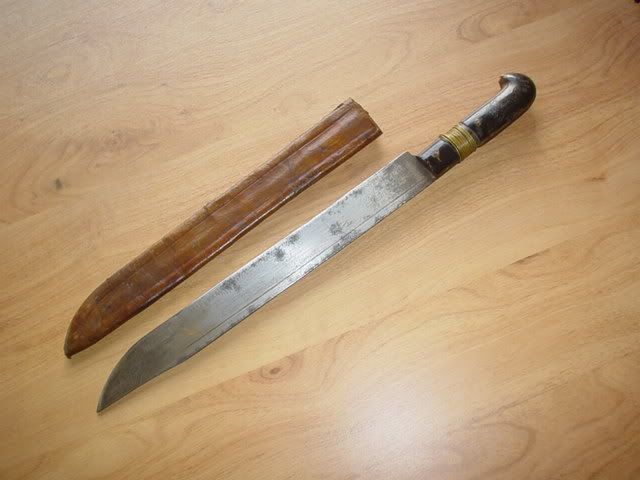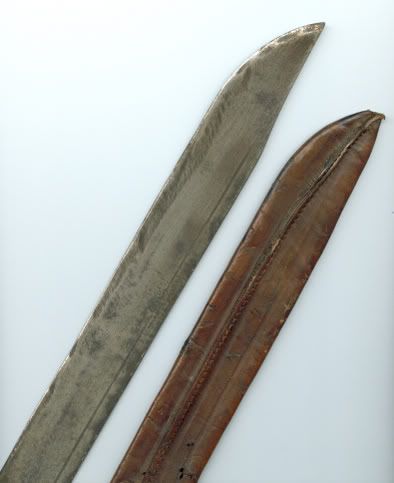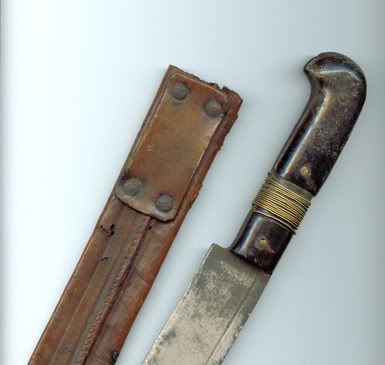
 |
|
|
#1 |
|
Member
Join Date: Jan 2006
Location: Kent
Posts: 2,653
|
Cannot identify this Knife/sword? The three parallel grooves either side of the blade suggest Taureq / Taureq region (Sudan ?) as it's origin. Its not a reworked european blade,although its shape suggests it is. Its well balanced and feels more like a machete type knife? or a slaughter knife. The handle appears to be wood covered in leather. The scabbard is a good fit, nicely made, leather with tooling marks creating a repeated diamond pattern on the central panel.
The blade edge is still relatively sharp, even though it has not be sharpened for some time (the rust/patina is the same all over) The blade is 39cm (approx. 15 1/2" long) overall length 50cm (20""). Has anyone got any ideas please, thankyou 
|
|
|

|
|
|
#2 |
|
Member
Join Date: Jun 2005
Posts: 210
|
It looks like a remounted English machete.
n2s |
|
|

|
|
|
#3 |
|
Member
Join Date: Dec 2004
Location: What is still UK
Posts: 5,806
|
I nearly bid on this one too! Looks rather nice with some age. Obviously you have the knife to handle but reshaping trade machete has a long tradition in west Africa and they are then truly Africanised as yours appears to be. As noted earlier pinpointing the location of many African weapons/artifacts can be tricky without some very distinctive style. I my opinion this is not Tuareg work but work from the arid areas of the coastal countries of west Africa which are well within the areas visited by the Tuareg and ofcourse goods would be traded. I have two knives coming soon from the same areas, one I believe may well be Tuareg. I will add to this thread when they arrive. Tuareg work is usually distinctive by the use of more coloured leather. I am sure other members will be able to provide many good examples. I am going have to raise my stakes
 good buy. Tim good buy. Tim
Last edited by Tim Simmons; 18th March 2006 at 08:31 PM. |
|
|

|
|
|
#4 |
|
Member
Join Date: Dec 2004
Location: What is still UK
Posts: 5,806
|
I am fairly confident that from the vast regions where these knives are popular this one is Tuareg. Not every knife is in the distinctive coloured leather and engraved metal work as mentioned above. Knives could be obtained from the surounding settled peoples so there are a great many styles to these items. Tim
Last edited by Tim Simmons; 18th March 2006 at 08:55 PM. |
|
|

|
|
|
#5 |
|
Member
Join Date: Dec 2005
Posts: 692
|
Nice telek Tim! I've always wanted one of them. OK, they were worn on the arm, but can anybody explain how precisely?
|
|
|

|
|
|
#6 |
|
Member
Join Date: Dec 2004
Location: What is still UK
Posts: 5,806
|
I believe as a rule they were worn on the forearm with the tip to the elbow. I think at times and surely so with the most decorative ones, the weapon on the outside of the forearm to show your wealth/status and swagger with. when needed they could also be worn with the weapon on the inside of the forearm.
|
|
|

|
|
|
#7 |
|
Member
Join Date: Jan 2006
Location: Kent
Posts: 2,653
|
I agree, the telek is very nice indeed.
Has anyone any idea as to the function of this re-worked machete? Would it be considered a working tool, a weapon or a combination of both? Was/is the quality of the imported(?) trade machete blades considered better than locally available blades? Or Less? Or is it just the fact that it would be easier to rework a blade, than creating one from scratch. |
|
|

|
|
|
#8 |
|
Member
Join Date: Dec 2004
Location: What is still UK
Posts: 5,806
|
These pictures of Africanised English machete are from "African Arms And Armour, British museum publications, Christopher Spring". A book well worth having for basic information. Yours is not as fine as these but still I think a nice knife which I would think was all purpose in its function.

|
|
|

|
|
|
#9 |
|
Member
Join Date: Dec 2004
Location: Sint-Amandsberg (near Ghent, Belgium)
Posts: 830
|
Here's a knife which could fit in the same category, although it's a bit smaller. There are no marks on the blade, but it could easily be an adapted European butcher's knife.
I got this one from a man who used to live in Congo before 1960. He said it was a hunting knife used by the (Ba)Kongo-tribe. It has a simple, but sharp blade. It looks like a kind of large Bowie knife. The blade has a groove on both sides. The handle is, in my opinion, made of bakelite with some copper wire to decorate it. The sheath is made from leather and has on one side a loop for fastening it to a belt. Total length : 42 cm. Length of blade : 30,8 cm. Width of blade : 3,5 cm.   
|
|
|

|
|
|
#10 |
|
Member
Join Date: Dec 2004
Location: What is still UK
Posts: 5,806
|
Hi Freddy,
That's a very good match for the shape. It looks like it is an outright European trade knife with no local adaption except for the brass wire. Uncanny similarity  . .
|
|
|

|
|
|
#11 |
|
Member
Join Date: Jun 2005
Posts: 210
|
 Here is another converted machete. n2s |
|
|

|
 |
|
|